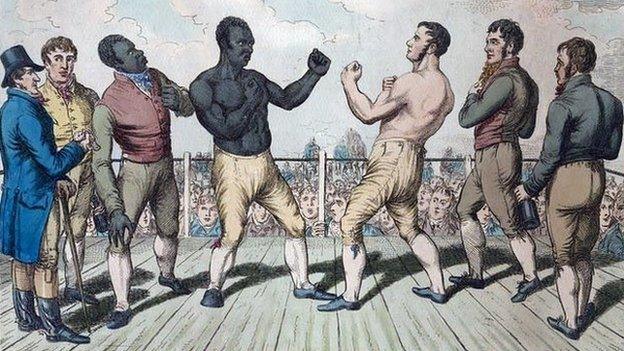The Vocabularist: Are fans fanatical or fanciful?
- Published

England cricket's Barmy Army are one of the most dedicated groups of fans
With the Rugby World Cup under way it would be nice to explain why sports supporters are called "fans" - but we don't know for sure, writes Trevor Timpson.
"Fanatic" derives from the Latin "fanum" meaning "shrine" and Dr Johnson defined it as "struck with a superstitious frenzy".
"Fancy" is essentially the same word as "fantasy", from the Greek phantasia, its meanings shading through appearance, opinion, enthusiasm for something - and sometimes delusion.
"The fancy" was a term for sport enthusiasts long before "fan" first appeared in US baseball circles in the 1880s. Essayist William Hazlitt wrote in 1822 of a man "whose costume bespoke him one of the FANCY, and who had risen from a three months' sick bed" to go to see a prize fight.
In 1851 the New York Times wrote of a courtroom brawl: "Even bets could have been taken if any one of the 'fancy' had been present."
Though mainly applied to boxing, "the fancy" could be followers of other sports, as well as interests ranging from book collecting to pigeon breeding.
In 1871 the New York Times said - of Chicago - "Baseball is all the rage among the fancy young men of the city."
But the earliest recorded users of "fan" for sports enthusiasts linked the word to "fanatic" from the start. One of the first written records - in the Kansas City Times in 1885, external - says: "Of course a fan is a fanatic."

The fight between Tom Molineaux and Tom Cribb in 1810. "The fancy" followed various interests, but especially prizefighting.
Baseball manager Ted Sullivan, who claimed that he invented the term in St Louis in 1883, said the same.
He wrote that after listening to a baseball bore reeling off facts and statistics and being told "he is a fanatic", he said: "I will abbreviate that word and call him a fan, external."
Some experts still believe "fancy" is the main source., external If the phrase "baseball fan" was already known, perhaps coupling it with "fanatic" was simply wit.
But what about "fan", meaning something for blowing air with? That comes from the Latin word vannus, originally a shovel or basket for tossing and winnowing grain.
It has even been suggested that sports fans were originally spectators who fanned themselves - or more rudely, that they were so called because they were windbags.
Fans may be fanatical about one theory of the word's origin, and dismiss others as fantasy. But then that is part of the fun of being a fan.

The Vocabularist
•What makes a crisis more than a drama?
•How did cappuccino get its name?
•The fiery word 'brand' hits the spot
•The peculiar names of punctuation marks
•Is it OK to be a 'buccaneer'?
Select topic "language" to follow the Vocabularist on the BBC News app

Subscribe to the BBC News Magazine's email newsletter, external to get articles sent to your inbox.